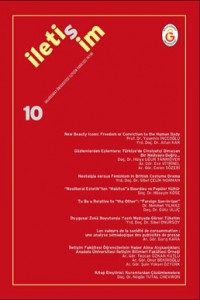Abstract
The fact "the other" as a concept fills up various identities in a wide range and, furthermore, provides those various identities in a wide range with the opportunities of being able to be together. In the context of the fact "the other", when placing "us" and "the others" who are not from "us", the important role which is committed by mass media (television and especially television series format) cannot be denied in creating the images of "us" and "the others". With the pre-recognition of the fact "the other" in the TV series called "Foreign Sonin-law" with higher ratings in Turkish television will conceptually and theoretically be discussed over the presentations of "us" and "the others". In the so-called series with a plot of a marriage that created "mandatory" relations between the members of two families one of which is from a city (Gaziantep) where the traditional and religious values are relatively considered important and the other is from Greece, a country which is considered the opposite of what is nationally and religiously believed as right by the part; both nations become mirrors for each other by the help of these families, and conflicts, arguments and differences between the nations are presented by the events series within individual relations level. In the example of the mentioned television series, the existence of "the other" as international actors in Turkish television, how and who is forced to be the other is explicated; individual relations and collective perceptions as premise/sequent, and Greece placed as "the other-foreign" with its citizens in Turkish community are discussed with the attributions imputed on them indirectly by mass media creating an "other" in the presentation mechanisms and the ways of using those mechanisms in the television series are evaluated with a critical point of view and a hermeneutic method.
"Les représentations ne devraient pas s'annuler, comme les équations mathématiques". (Steet, 2000:10)
Abstract
Autrui en tant que concept remplit des diverses identités au niveau de l'individu et de la société et assure la co-existence de ces identités. En ce qui concerne la notion d"Autrui", on ne peut pas négliger le rôle des média dans le positionnement de "nous" et d"Autrui", qui n'est pas de nous et dans la création des images de "nous" et des "autres". Ce phénomène peut être observé dans tout sa puissance d'influence à la télévision. Dans cet article on essayera de discuter la notion de d"Autrui" à travers les représentations de "nous" et de d"Autrui" dans la série télévisée nommée "Le Beau-fils Étranger". Cette série télévisée parle des rapports forcés résultant du mariage des individus d'une famille qui vit dans un arrondissement (Gaziantep) où on sent le plus intensivement des valeurs religieuses dans la vie sociale et d'une autre famille grecque qui est perçue comme le contraire de ces valeurs nationales et religieuses. Dans ce contexte on voit se miroiter toutes les deux sociétés à travers les deux familles et les contradictions, les conflits, les différences entre ces deux sociétés qui existent depuis tant d'années qui sont représentés à travers les événements qui ont lieu au niveau des rapports individuels. Cette série télévisée nous permet d'examiner la présence d"Autrui" comme acteurs internationaux; comment et qui est posé comme l"Autrui" en télévision turque. Donc on fréquente le domaine de la représentation et on considère les mécanismes de représentations qui créent un "Autre" à travers les médias. Dans l'article les usages qu'on fait de ces mécanismes sont évalués avec une approche critique et une méthode interprétative.
Abstract
Bir kavram olarak"öteki" olgusu gerek birey gerekse toplum düzeyinde, çok çeşitli kimliklerin içini doldurmakta ve yine bu çok çeşitli kimliklere bir arada olabilmenin olanaklarını sağlamaktadır. "Öteki" olgusu bağlamında "biz"in ve "biz"den olmayan "ötekiler"in konumlandırılmasında, "biz" ve "ötekiler" imgelerinin yaratılmasında medyanın üstlendiği önemli rol yadsınamaz. Günümüzde olgunun en geniş etkileme potansiyeli ile yaşam bulduğu alanın televizyon olduğunu ifade etmek olanaklıdır. Bu bağlamda çalışmada "öteki" olgusu, "Yabancı Damat" dizisindeki "biz" ve "öteki" temsilleri üzerinden tartışılmaya çalışılmaktadır. Geleneksel ve dini değerlerin sosyal yaşamdaki ağırlığının görece daha fazla hissedildiği bir yörede yaşayan (Gaziantep) bir aile ile bu değerlerin ulusal ve dini karşıtı olarak algılanan Yunanlı bir ailenin bireylerinin, çocuklarının evliliklerinden doğan "zorunlu" ilişkilerini konu olan dizide; her iki toplum aileler üzerinden birbirine ayna olmakta, toplumlar arasında tarihler boyu yaşanan çelişkiler, çatışmalar, farklılıklar bireysel ilişkiler bazında gerçekleşen olay örgüleri içinde temsil edilmektedir. İncelenen dizi örneğinde Türk televizyonunda uluslararası aktörler olarak "öteki" olanın varlığı, kimin nasıl ötekileştirildiği irdelenmekte; dolayısı ile temsil alanında çalışılarak, medya dolayımlı bir "öteki" yaratan temsil mekanizmalarının değerlendirilmesi ve televizyon dizisinde bu mekanizmaların kullanılma yolları eleştirel bir bakış açısı ve yorumlayıcı bir yöntem ile ele alınmaktadır.
Details
| Primary Language | English |
|---|---|
| Journal Section | Articles |
| Authors | |
| Publication Date | June 1, 2009 |
| Published in Issue | Year 2009 Issue: 10 |



